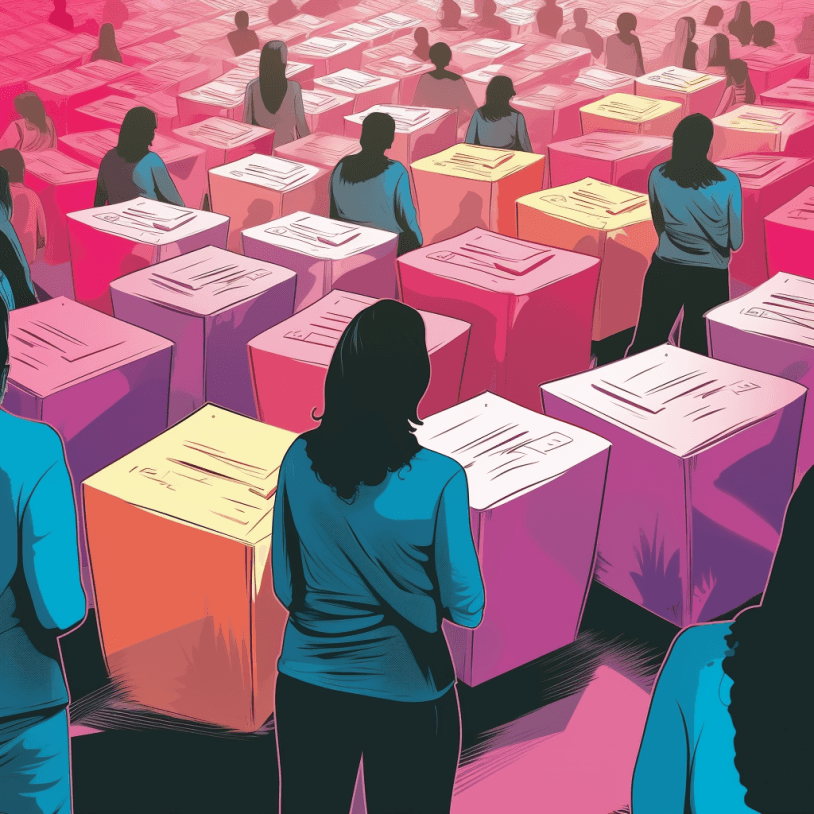
Types of Elections Explained: Navigating the Electoral Landscape
Elections are vital in democratic systems, serving as the cornerstone of political representation and governance. They empower individuals to have a say in shaping their communities, regions, and nations. Citizens exercise their democratic rights and contribute to decision-making processes when they participate in elections. Let's explore the diverse landscape of elections, from local to presidential elections, and shed light on their significance.
General Elections
General polls play a pivotal role in democratic structures, serving as the cornerstone of the electoral landscape. These elections determine the direction of national leadership and shape the governance of a country.
A general election is a large-scale electoral event that takes place at regular intervals, usually every few years. It aims to select representatives who will hold positions of power in the government. The frequency of general polls varies across different countries. Some hold them annually, while others follow a longer cycle, such as every four or five years. The specific electoral process also differs among nations, but it typically involves casting votes to choose candidates or political parties.
The process of selecting representatives in general polls is a multi-step affair. Political parties or individual candidates campaign vigorously, presenting their policies, visions, and goals to the electorate. Citizens exercise their right to vote, expressing their preferences and opinions on who should lead the nation. The delegate selection process is carried out through various voting methods. These include first-past-the-post, proportional representation, or a combination of both, depending on the electoral system in place.
The significance of general elections cannot be overstated. These elections serve as a powerful mechanism for determining national leadership, shaping policies, and influencing the direction of a country. They allow citizens to exercise their democratic rights and have a say in making policies. These elections serve as a reflection of the collective will of the people. They play a crucial role in ensuring political representation and accountability.
Primary Elections
The primary elections serve as the primary mechanism through which parties choose their candidates for the general elections. Winning a primary election is often considered a crucial step toward securing a party nomination process. Primary polls allow voters to actively shape the party's platform and direction by supporting candidates whose positions align closely with their own. Moreover, primary election results can provide early indicators of voter sentiment and shape the overall narrative of the election cycle.
Primary Polls
Primary polls are a crucial stage in the electoral process as they help select candidates for elections. Besides, they allow party members and registered voters to express their preferences and influence the outcome of the final race.
The purpose of primary polls is twofold. Firstly, they allow political parties to identify their preferred candidates by gauging their popularity and support among party members and voters. Secondly, primary elections enable voters to actively shape the political landscape by casting their votes for the candidates they believe best represent their interests.
Primary polls come in different forms, including closed, open, and semi-closed primaries. Only registered party members can vote for their respective party's candidates in closed primaries. This system ensures that party members have a significant say in candidate selection.
On the other hand, states with open primaries allow registered voters to participate in any party's primary election regardless of party affiliation. This promotes inclusivity and encourages broader engagement in the democratic process. Semi-closed primaries balance closed and an open primary by allowing registered party members and unaffiliated voters to participate.
The significance of primary polls lies in their ability to shape the choices presented to voters in elections. By narrowing down the pool of candidates, primary polls help political parties determine the most viable contenders to represent them in the final race.
Moreover, primary polls allow voters to evaluate candidates' positions on key issues and assess their leadership qualities, ultimately influencing the campaign's direction and the subsequent governance of elected officials.
Primary polls play a vital role in the democratic process by serving to select political party candidates for the general polls. The primary election phase is crucial in narrowing down the field of potential candidates and determining the final contenders who will represent their respective parties.
The primary polls allow party members and registered voters to have a say in choosing their preferred candidate from within their party. They also allow candidates to showcase their qualifications, policy positions, and ability to garner support from voters.
There are different types of primary polls, each with unique characteristics. A closed primary restrict participation to registered members of a specific political party. Only individuals affiliated with the party can vote for their preferred candidate. On the other hand, open primaries allow any registered voter to participate and vote for candidates from any party.
Semi-closed primaries combine elements of both closed and open primaries, permitting unaffiliated voters to participate while reserving some exclusivity for registered party members.
Local Elections
Local elections play a crucial role in community development, making them an essential aspect of the electoral landscape. These elections are conducted at the municipal, city council, and county levels. They allow residents to directly participate in shaping their local governance.
Municipal elections focus on mayoral elections and other officials who oversee the administration of cities and towns. These officials play a pivotal role in policymaking processes that impact public services, infrastructure development, and the overall well-being of local communities. Through municipal elections, residents can select leaders who align with their vision for the growth and improvement of their neighborhoods.
City council elections are another vital component of local elections. City councils consist of elected representatives who make important decisions regarding local policies, budgets, and regulations.
These representatives act as a voice for the community, advocating for the needs and interests of their constituents. Residents can contribute to the composition of these influential bodies, thereby shaping the direction and priorities of their city when they participate in these elections.
County elections are held to elect officials overseeing county-level governance and public services. These elections involve positions such as county commissioners, sheriffs, and other administrative roles. The outcomes of county elections directly impact various aspects of community life, including law enforcement, social services, and regional development.
The impact of local elections goes beyond the selection of individual candidates. They have a profound influence on public services and grassroots representation. Through active participation in local elections, community members can ensure that their voices are heard, their concerns are addressed, and their interests are prioritized.
By electing representatives who genuinely understand the needs of the local population, communities can foster a sense of empowerment and collaboration, leading to effective governance and positive change.
Regional/State Elections
Regional and state-level elections shape policies and governance within specific geographical areas. These elections, held at the regional or state level, offer unique opportunities for citizens to influence local issues that directly affect their communities.
Regional or state-level elections serve as a crucial platform for selecting representatives who will advocate for the interests of their respective regions. These elected officials are responsible for formulating policies, developing legislation, and making decisions that address regional concerns and aspirations. By participating in these elections, voters directly impact the governance and direction of their regions.
Electoral systems employed in regional or state-level elections may vary across different areas. Some regions may use a proportional representation system, ensuring fair representation for various political parties based on the proportion of votes received. In contrast, other regions may adopt a winner-takes-all system, where the candidate with the most votes secures the position. This electoral system diversity reflects each area's regional contexts and preferences.
The outcome of regional elections can significantly influence state-level policy-making. Elected regional representatives often play an active role in state legislatures, shaping policies and influencing the allocation of resources for their regions. The collective voice of regional representatives helps ensure that diverse perspectives and regional interests are taken into account during the process of making policies. This results in more inclusive and representative governance.
Overall, regional and state-level elections foster democracy by allowing citizens to participate in the governance of their specific regions. The diversity in electoral systems across regions reflects each area's unique characteristics and needs. At the same time, the impact of regional elections on state-level policy-making ensures a more comprehensive and balanced approach to governance.
Special Elections
Special elections serve a specific purpose within the electoral landscape. Unlike general elections, which occur on a fixed schedule, special polls are held outside the regular election cycle. They are conducted to fill vacant political positions or address specific issues that require immediate attention.
One key distinction between special polls and general polls is their timing. The elections are held according to predetermined schedules, but specific circumstances trigger special polls. These include resignation, death, or removal of an elected official. They are designed to swiftly address the need for representation or resolve pressing matters that must be resolved before the next election.
Special elections are crucial in filling vacant positions and ensuring the continuity of democratic processes. Special polls allow citizens to choose a new representative who will step into the role and fulfill the responsibilities of the position. These elections allow for the swift restoration of representation and in making decisions.
Furthermore, special elections provide a means to address a specific issue or an initiative that require public input. They allow voters to express their preferences on pressing matters that may affect the community or region significantly. Elections enable citizens to engage in the democratic process, shaping the direction and policies of their localities.
Referendums and Initiatives
Democratic systems embrace the concept of direct democracy, where citizens actively participate in decision-making. A referendum and an initiative are two key mechanisms through which this form of direct democracy is implemented.
Citizen Participation in Decision-Making
Referendums and initiatives offer citizens a direct voice in shaping policy by allowing them to vote on specific policy issues or proposed laws. This form of democratic engagement enables individuals to have a direct impact on policy-making.
Voting on Specific Policy Issues or Proposed Laws
During a referendum, citizens are presented with a specific policy question or proposal and cast their votes to determine the outcome. This can include decisions on constitutional amendments, major policy changes, or significant societal issues. An initiative, conversely, involve citizens gathering signatures to place a particular proposal on the ballot for a voting process. Referendums and initiatives allow citizens to express their preferences and contribute to the democratic process.
Through referendums and initiatives, democratic processes foster a sense of active citizenship, empowering individuals to directly influence policies and laws that shape their communities. Allowing citizens to vote on specific issues, referendums, and initiatives promotes a more inclusive and participatory decision-making process within the electoral landscape.
By-Elections
By-elections are crucial to democratic systems, filling vacant legislative seats between regular elections. These elections occur when a representative position becomes vacant for reasons such as resignation, death, or disqualification. A by-election plays a vital role in maintaining effective representation and ensuring constituents have a voice in policy-making.
When a legislative seat remains empty, it can lead to a lack of representation for the constituents it was meant to serve. By-elections act as a mechanism to rectify this situation promptly. They allow voters to choose a new representative to advocate for their interests and concerns. This ensures that the affected constituency continues to have a voice in the legislative process and safeguards the democratic principle of political representation.
In addition to maintaining representation, a by-election affects the political dynamics. These elections often draw considerable attention from political parties and candidates as they present an opportunity to gain or strengthen a foothold in a specific constituency. By-elections can be indicators of public sentiment and serve as a testing ground for new or emerging political movements.
By-elections can influence the overall balance of power within legislative bodies. The outcome of these elections may affect the governing majority, coalition dynamics, or the strength of opposition parties. Therefore, by-elections have the potential to shape the political landscape and influence policy debates and decision-making processes.
International Elections
International elections offer valuable insights into the diverse practices and electoral systems. Each country has its unique approach to conducting elections, reflecting its political structure and cultural values. Understanding these variations can broaden our perspective on democratic processes beyond national borders.
Electoral systems differ significantly from one country to another. Some nations adopt a first-past-the-post system, where the candidate with the most votes wins. In contrast, others implement proportional representation, ensuring that political parties gain seats proportionate to the votes they receive. Mixed systems combining elements of both also exist in several countries.
Noteworthy examples of international elections include:
1. United Kingdom: The United Kingdom employs a parliamentary system where citizens elect members of Parliament. The Prime Minister is chosen from the party with the majority of seats in the House of Commons.
2. Germany: Germany employs a mixed-member proportional representation system, allowing citizens to cast two votes: one for a specific candidate and another for a political party. This system ensures a balance between direct representation and party proportionality.
3. India: India, with its vast and diverse population, conducts elections enormously. The country utilizes the first-past-the-post system, and its electoral process is a testament to the logistical challenges of managing a democratic election in a densely populated country.
4. Australia: Australia employs a preferential voting process, where voters rank candidates in order of preference. If no candidate receives an absolute majority, the lowest-ranked candidate is eliminated, and their votes are redistributed until a winner emerges.
These examples illustrate the range of electoral systems and practices employed worldwide. The international elections help gain valuable insights into different approaches to political representation, voting methodologies, and the challenges associated with conducting fair and inclusive elections on a global scale.
Implications of Election Types
Different election types have distinct implications for democratic systems, each with advantages and challenges. One advantage of primary polls is that they allow party members to have a direct say in selecting their candidates, promoting internal party democracy. However, one challenge of Runoff Primary polls is the potential for candidates with extreme ideologies to win nominations due to the partisan nature of these contests.
General polls, on the other hand, provide a broad platform for voters to express their preferences and shape the overall direction of the country. They offer a wider range of voters the opportunity to participate and elect representatives who align with their interests. However, one challenge of these elections is the risk of low voter turnout, which can undermine the legitimacy of the elected representatives and lead to skewed outcomes.
Voter turnout is a crucial aspect of elections as it reflects the level of citizen engagement and the legitimacy of the democratic process. Different election types can influence voter turnout in various ways. Primary polls tend to have lower turnout than general polls, as they involve a narrower pool of party members. However, general polls often witness higher turnout due to their broader appeal and significance in determining national leadership.
Representation is another key consideration. Primary elections shape party dynamics by selecting candidates representing their respective parties in the general polls. This process affects the diversity and inclusivity of political representation. In general elections, the winning candidates become representatives of the entire constituency, aiming to represent a wide range of interests and viewpoints.
The election types employed within a democratic system can impact political stability and policy-making. Primary polls allow party members to participate in candidate selection, contributing to internal party cohesion and reducing potential conflicts. General polls hold the power to either maintain or change the political landscape, which can lead to shifts in policy priorities.
The choice of election types can also affect the overall stability of the political system. Countries with robust and inclusive electoral systems tend to experience smoother transitions of power and greater political stability. Conversely, flaws in election processes, such as voter disenfranchisement or inadequate representation, can undermine the legitimacy of the elected government and lead to social and political unrest.
Similarly, different election types can influence the priorities and agendas of elected officials in policy-making. Primary elections, especially within specific parties, can cater to the interests of the party's base. General elections, on the other hand, require candidates to appeal to a broader electorate, leading to a more diverse range of policy proposals and potential compromises.
In conclusion, understanding the different types of elections is essential for fostering an engaged and informed citizenry. Elections serve as the cornerstone of democratic systems, shaping representation and governance. GoodParty.org shares this commitment to promoting civic engagement and encourages you to get involved.
By learning more about GoodParty.org and our efforts to empower individuals in the political process, you can actively contribute to creating a more participatory democracy. Explore our initiatives, join the conversation, and make a difference in your community. Together, we can build a stronger democracy that reflects the diverse voices and values of its people.
Take the first step and join GoodParty.org today!

